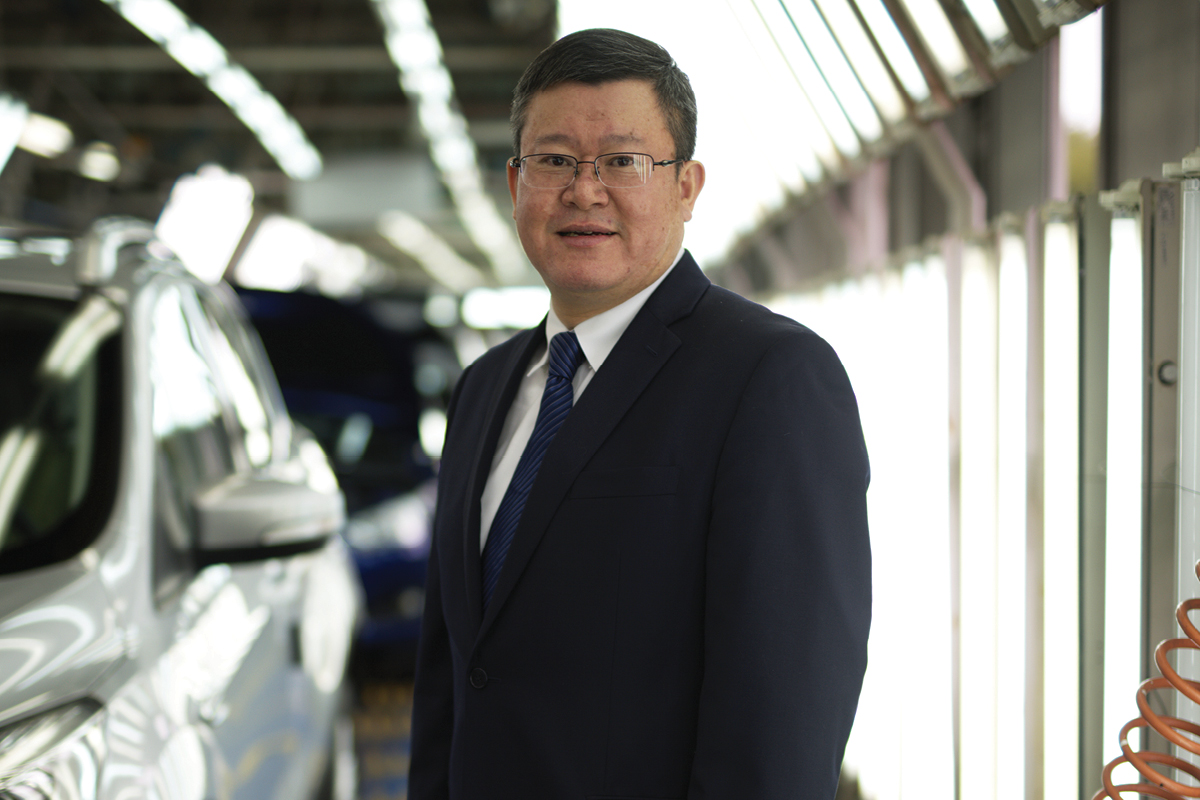Tim Ju grew up in a time when cars were a luxury only the rich could afford. With more than 25 years’ experience in the Chinese automotive industry, Tim started at the bottom at Taiwan-based Ford Lio Ho (FLH), working his way up through the ranks to CFO and business adviser and now CEO.
“I joined Ford at a time of growing interest in the industry. Unlike other consumer markets, the car industry gets people very excited. Everyone wants a new car,” says Tim. In addition to importing vehicles such as EcoSport, Mondeo, Mustang, Ranger and Tourneo Custom, FLH has been the primary manufacturer and distributor of Ford vehicles in Taiwan since 1972.
The joint venture is owned by Michigan-based Ford Motor (70%) and the former Lio Ho Automotive, which previously assembled Toyota vehicles (30%). “The automotive industry has changed significantly over the past 100 years.
We’ve seen the introduction of more and more players into the market, and have experienced serious disruptions by Silicon Valley,” explains Tim. “Ford has always needed to evolve in all areas – finance, development, manufacturing, quality control and IT. All major functions within the company are finance controlled, so while working as CFO, I was exposed to every aspect of our operations. This gave me
a solid, comprehensive view of the company and equipped me with the skills needed to move up to a management role.”
Listening to the customer
With a 46-year manufacturing history, FLH has provided for more than two million customers in Taiwan and overseas markets with best-in-class quality, safety, and fuel efficiency vehicles. “Over the past 10 years, society has developed a strong concern for global warming and fuel efficiency, while manufacturers worry that oil reserves could soon run dry,” says Tim. “China is by far the largest automotive market in the world so, to stay ahead, we have to listen very closely to what Chinese customers want and need.

A key item on our agenda has been to develop technology that will help improve fuel efficiency and reduce vehicle emissions.” Unveiled in 2011, the Ford EcoBoost engine represents a huge advancement in Ford engine technology. In the wake of the 2008 global financial crisis and soaring oil prices, Ford dedicated its best and brightest to design an all-new engine.
The end product was a turbocharged, direct injection engine that delivers up to 20% better fuel efficiency than its larger conventional counterparts, and 15% fewer greenhouse gas emissions without sacrificing horsepower.
“Our team in Taiwan has been working hard to improve fuel efficiency to meet the government’s emission requirements. The technology in our hybrid vehicles and EcoBoost is strong, and very well-received in Taiwan and the global market,” says Tim.
An engine that reduces running costs for customers
Undefeated in its category, the 1.0-litre EcoBoost engine has won 10 International Engine of the Year awards including Overall Winner three times and Best Newcomer. From 2018 onwards, the engine will deliver reduced running costs for customers by automatically deactivating one of its three cylinders while coasting or cruising, as full capacity is not needed.
“We are also a leader in driver-assisted technologies such as cruise control and lane-keeping awareness,” says Tim. “Ford vehicles are spread throughout North and South America, Europe, and Asia–Pacific. Therefore, we have developed a substantial range of products that meet local consumer requirements while maintaining the renowned world-class quality. That’s why we announced last year that we are investing US$130 million into production advancement, process optimisation, facility upgrades and new product introductions.”
Over the next five years, the program will aim to improve Ford vehicle quality through the purchase of new equipment and the introduction of intelligent production. Under the ‘One Ford’ strategy, which emphasises global vehicles and platforms, Tim says FLH will manufacture a mid-sized Escort passenger car using Ford’s C-Car chassis.
Despite an ambitious government initiative designed to help improve air quality, Taiwan has been slow to embrace electric vehicles (EVs). According to the island’s Environmental Protection Administration, emissions from motor vehicles are the main source of air contaminants in Taiwan’s urban areas.
Development Strategy and Action Plan
To date, the government’s Smart EV Development Strategy and Action Plan has seen the introduction of 70 electric buses, with another 150 due by the end of this year. Although the program promises to phase out the most polluting gas scooters within a few years, little effort has been made to boost the adoption of EVs in Taiwan.
Following the creation of the specialised ‘Team Edison’ to accelerate EV development, Ford will significantly increase its planned investments in EVs to US$11 billion by 2022 and have 40 hybrids and complete EVs in its model line-up.
“When it comes to alternative energy sources, EVs are going to change the game. FLH has been researching and developing cars that have low-displacement engines to meet the government’s emission standards,” explains Tim. “We are planning to introduce a new hybrid vehicle into the Taiwanese market, and have put together an expert team to develop the batteries needed to power EVs.”
Once the government puts forward a comprehensive and sustainable policy for EVs, the company will begin developing electric cars. However, at this stage, the lack of charging infrastructure is yet to be addressed.
Tim also sees autonomous vehicles on FLH’s horizon. “The future of artificial intelligence and the Internet of Things provides us with smarter ways of dealing with mobility. The entire automotive industry is geared towards driverless cars as our society continues to grow rapidly.”



